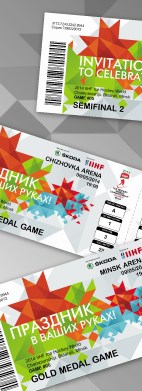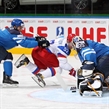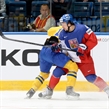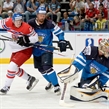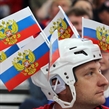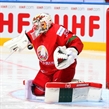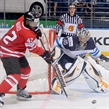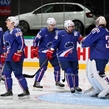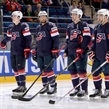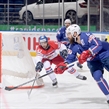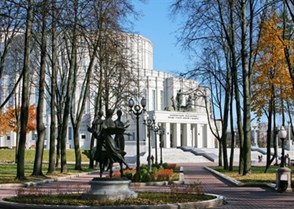Post game comments 2014 IIHF Ice Hockey World Championship gold medal game - Ovechkin (RUS), Zaripov IN RUSSIAN (RUS), Malkin (RUS) and Rinne (FIN)
Information
Tournament Format
The 16 teams are divided into two groups for the Preliminary Round.
The top-four ranked teams of each group advance to the quarter-finals that will be played cross-over. The first-place team in each preliminary-round group plays the fourth-place team of the other group, while the second-place team plays the third-place team of the other group. 1A-4B, 2A-3B, 1B-4A, 2B-3A. The winning teams advance to the semi-finals.
Semi-final pairings: Winner 1A-4B vs Winner 2B-3A, Winner 1B-4A vs Winner 2A-3B. Both semi-final games will be played at Minsk Arena.
The winning teams of the semi-final games advance to the gold medal game while the semi-final losing teams play for bronze.
Relegation format
The overall bottom ranked two teams will be relegated to the 2015 IIHF Ice Hockey World Championship Division I Group A.
The teams promoted to the 2015 IIHF Ice Hockey World Championship will be the top-two teams of the 2014 IIHF Ice Hockey World Championship Division I Group A, Slovenia and Austria.
Three Point System
For all games points shall be awarded as follows:
- 3 points for the winning team at the conclusion of regulation time
- 1 point for both teams at the conclusion of regulation time if the game is tied
- An additional point earned for the team winning the game in a 5-minute overtime period, or the Game Winning Shots Procedure if the teams are still tied following conclusion of the overtime period
- 0 points for the team losing the game in regulation time
Overtime Operations
If a game is tied at the end of regulation time, a five-minute overtime period shall be played immediately after an intermission of three minutes. The teams will defend the same goals as in the third period. The game will end when the five minutes has expired or when a goal is scored; the scoring team will be declared the winner. If no goal is scored in the overtime period then the Game Winning Shots Procedure will apply. All overtime periods of any IIHF game shall be played with each team at the numerical strength of four (4) skaters and one (1) goalkeeper.
Overtime procedure in Play-Off Games:
- In case of a tie at the conclusion of regulation time in a Quarter Final, Semi Final and Bronze Medal Game, there will be a 10-minute sudden-death overtime period played, following a three-minute intermission.
- The teams will defend the same goals as in the third period.
- The team, which scores a goal during this period is the winner.
- In the Gold Medal game there will be a 20-minute sudden-death overtime period, following a 15-minute intermission during which the ice will be resurfaced.
- The teams will change ends.
- The team which scores a goal during this period is declared winner.
- If no goal is scored during the sudden-death overtime, there will be Game Winning Shot (GWS) competition ("shootout") according to the Game Winning Shots Procedure.
Game Winning Shots Procedure
If no goal is scored in the overtime period then the Game Winning Shots (GWS) procedure will apply. The following procedure will be utilized:
- Three different shooters from each team will take alternate shots, until a decisive goal is scored.
- If the game is still tied after three shots by each team, the GWS will continue with a tie-break shoot out by one player of each team, with a reversed shooting order. The same or new players can take the tie-break shots.
- The same player can also be used for each shot by a team in the tie-break shoot-out.
- Only the decisive goal will count in the result of the game.
- Shots will be taken at both ends of the ice. The area of the ice to be used will be dry scraped.
- A coin toss will determine which team takes the first shot, with the winner of the toss having the choice whether his team will shoot first or second.
- Any player whose penalty was not over when overtime ended cannot take the shots and must stay in the penalty box or in the dressing room.
- Once named, players may only be replaced in the event of injury or penalty.
- The substitute stand-by player is placed last in the shooting order.
- The goalkeepers will defend the same goal, as determined by the Referee. The goalkeepers from each team may be changed after each shot.
- The players of both teams will take the shots alternately until a decisive goal is scored.
- The decisive goal will be credited to the player who scored and to the goalkeeper concerned.
Tie breaking formula
The tie-breaking system for two teams with the same number of points in a standing will be the game between the two teams, the winner of the game taking precedence.
Due to the fact that the three-point system does not allow a game to end in a tie, then the following tie breaking procedure is applicable when three or more teams are tied in points in a Championship standing.
Should three or more teams be tied on points, then a tie breaking formula will be applied as follows, creating a sub-group amongst the tied teams. This process will continue until only two or none of the teams remain tied. In the case of two tied teams remaining, the game between the two would then be the determining tie-breaker as the game could not end as a tie. In the case of none of the teams being tied, the criteria specified in the respective step applies.
Step 1: Taking into consideration the games between each of the tied teams, a sub-group is created applying the points awarded in the direct games amongst the tied teams from which the teams are then ranked accordingly.
Step 2: Should three or more teams still remain tied in points then the better goal difference in the direct games amongst the tied teams will be decisive.
Step 3: Should three or more teams still remain tied in points and goal difference then the highest number of goals scored by these teams in their direct games will be decisive
Step 4: Should three or more teams still remain tied in points, goal difference and goals scored then the results between each of the three teams and the closest best-ranked team outside the sub-group will be applied. In this case the tied team with the best result (1. points, 2. goal difference, 3. more goals scored) against the closest best ranked-team will take precedence
Step 5: Should the teams still remain tied, then the results between each of the three teams and the next highest best-ranked team outside the sub-group will be applied.
Step 6: Should the teams still remain tied after these five steps have been exercised then Sport considerations will be applied and the teams will be ranked by their positions coming into the Championship (seeding).
Note: If not all mutual games have been played yet in an ongoing tournament, the tied teams will be ranked in the standings according to the following criteria: 1. Lower number of games played, 2. Goal difference, 3. Goals scored, 4. Positions coming into the Championship.
Final Ranking / World Ranking
The gold medal game and bronze medal game will determine the final ranking for the top-4 teams. The eliminated teams from the preliminary round plus the losing teams of the quarter-finals will be ranked following their positions in the groups preceding the quarter-final round.
The final ranking will follow the following procedure:
1. Higher position in the group,
2. Higher number of points,
3. Better goal difference,
4. Higher number of goals scored for,
5. Better seeding number
The IIHF World Ranking will be produced after the IIHF Ice Hockey World Championship. It is based on the rankings of the four most recent IIHF Ice Hockey World Championships and of the last Olympic men’s ice hockey tournament (including qualification tournaments).
Click here for more information on the IIHF World Ranking system.
More information
Click here to download the IIHF’s Rule Book and Sport Regulations.
Player Entry
- The teams submit the names of the participating players at the first Championship Directorate.
- The maximum number of players allowed on a Team Registration Form at the beginning of the World Championship is 22 skaters and 3 goalies. The minimum is 15 skaters and 2 goalies.
- At the first Directorate meeting, the teams must name at least the minimum number of 15 skaters and 2 goalkeepers. The players entered must be present at the championship venue by the time of the Directorate meeting.
- The remaining players up to the allowed maximum of 22 + 3 must be submitted for players' control two hours before any of the following championship games. Players can be added throughout the tournament until the roster is full.
- During a game, a team may enter (dress) 20 skaters and 2 goalkeepers on the Official Game Sheet, with the emergency goalkeeper standing by if a goalie entered to the Official Game Sheet is unable to play.
Eligibility
To play in the IIHF World Championship, the Olympic ice hockey tournament and the qualifications to these competitions, players must fulfill the following qualification requirements:
- Each player must be under the jurisdiction of an IIHF member national association
- Each player must be a citizen of the country he represents.
Acquiring a new national eligibility (The ‘two-year’ case)
When a player has changed his citizenship or has acquired another citizenship and wants to participate for the first time in an IIHF competition representing his new country he must:
- Prove that he has participated for at least two consecutive years in the national competitions of his new country during which period he has neither transferred to another country nor played ice hockey within any other country.
- Have an international transfer card (ITC) that shows the transfer to the national competition of his new country and which was approved and dated at least two years before the start of the IIHF competition in which he wishes to participate.
Change of national eligibility (The ‘four-year’ case)
A player, who has previously participated in IIHF competition, can switch national eligibility (but only once in a player's life) if:
- He is a citizen of the new country of his choice.
- He has participated for at least four consecutive years in the national competitions of his new country, during which period he has neither transferred to another country nor played ice hockey within any other country and has not played for his previous country in an IIHF competition during this four year period.
- He has an international transfer card (ITC) that shows the transfer to the national competition of his new country and which was approved and dated at least four years before the start of the IIHF competition in which he wishes to participate.
Belarus
An introduction in facts and figures about Belarus.
Official Name: Republic of Belarus
Total land area: 207,600 sq km
Population: 9.458 million
Population living in cities: 75.8%.
Capital: Minsk, 1.89 million inhabitants
Other regional centres of Belarus:
Brest: 321,000 inhabitants
Vitebsk: 367,000 inhabitants
Gomel: 507,000 inhabitants
Grodno: 346,000 inhabitants
Mogilyov: 363,000 inhabitants.
Languages spoken: Belarusian and Russian
National holiday: Independence Day, 3 July
Currency: Belarusian rouble (Br)
The Republic of Belarus is situated in the north-east of Europe. Within its territory it connects the CIS countries with the countries of Western Europe. Belarus shares common borders with Poland, Lithuania, Latvia, Russia and Ukraine.
Read more about Belarus: http://www.belarus.by/en
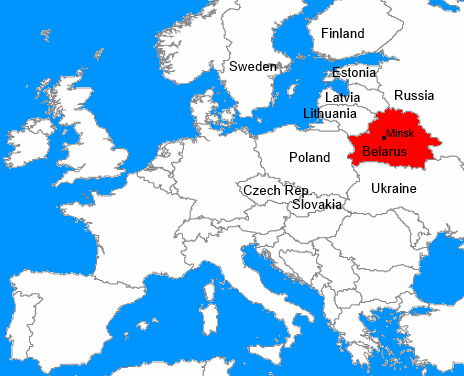
Minsk
Minsk is the capital and the largest city of the Republic of Belarus. It is home to about 20 per cent of the population of the country, a city in which all government bodies are concentrated. Since 1993 the city has been the official seat of the intergovernmental bodies of the Commonwealth of Independent States (CIS).
Minsk is older than many European cities. It was first mentioned in 1067. The history of Minsk is rich and tragic.
Few monuments of the remote past have remained in Minsk. During its long history, the city has repeatedly, almost to the ground, been destroyed by wars and fires. In tribute to the ancestors, an active work on the restoration of historic buildings was launched. The Lower Town and the Upper Town with their wonderful temples and secular buildings, the Trinity and Rakovsky suburbs with civil buildings of the 18th and 19th centuries are the golden fund of the architectural heritage of the Belarusian capital. Among the already restored objects there is the Minsk City Hall - a symbol of municipal government rights received in 1499 by the Magdeburg Law.
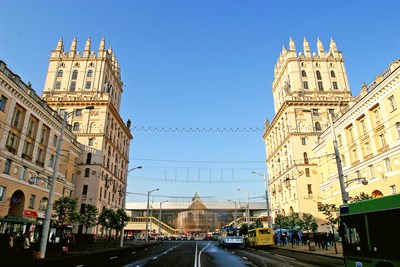
Before World War II, Minsk had a population of 300,000 people. During the World War II Minsk was a major centre of the Soviet partisan resistance movement against the invasion. For this role, Minsk was awarded the title Hero City in 1974.
Minsk was recaptured by Soviet troops on 3 July 1944, during Operation Bagration. In 1944, Minsk's population was reduced to a mere 50,000. After World War II, Minsk was rebuilt.
Today the population of Minsk is about 1.9 million people. It occupies an area of 307.90 sq km.
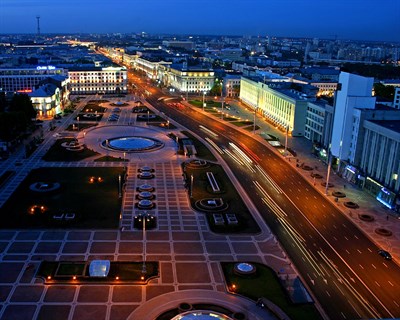
The development of Minsk was of universal nature, which provided the city versatility. After the World War II, the international relations of Minsk were determined not only by its geographical location, but also by the formation of a new industrial and cultural potential, new geopolitical realities on the European continent and in the world as whole.
Today Minsk is a modern, dynamic city, and the largest transport and logistics centre as well as the cultural and scientific centre of the country. One fifth of the employed in the industrial sector of the country are working for Minsk-based companies producing a quarter of the total industrial output of Belarus. The gross regional product of Minsk is traditionally high. The city boasts of its educated, skilled and hard-working people.
Natural and cultural public centres – parks and gardens – are favourite places of recreation for the Minsk residents. The Botanical Gardens of the National Academy of Sciences of Belarus are well-known far beyond the borders. It was created in 1932 and covers an area of 80 hectares. They have one of the richest collections of plants in Europe. The Botanical gardens are not only a major research centre, but also a favourite place of relaxation of Minsk residents and guests of the Belarusian capital. One of the most interesting objects of the capital is Boulders Park in the residential area of Uruchye. It occupies an area of 6.5 hectares and has a collection of 2134 boulder-stones brought from all over Belarus. Two-thirds of the park is occupied by the central exhibit "Map of Belarus", which is an outline that repeats the shape of the country on the map.
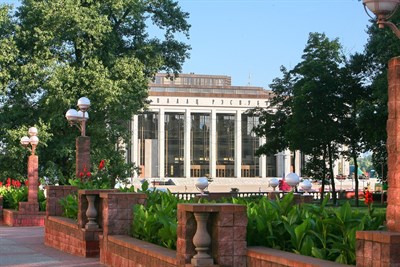
Minsk is a city of modest and concise beauty. It is a city of natural charm and warm-heartedness of its citizens – wise, peaceful and tolerant people. Minsk is a city of people who have their ambitions and prospects, who look to the future.
The coat of arms of Minsk: St. Virgin's Ascension shows St. Virgin in red and violet clothes on a silver cloud. She is ascended into the sky by two white flying angels with two cherubs above them. This emblem was granted to the city in 1591.
Read more about Minsk: http://minsk.gov.by/en/
Minsk City Executive Committee of Sport: http://minsksport.by/en
Culture
An extensive cultural program will be offered to fans and tourist during the 2014 IIHF Ice Hockey World Championship. In addition to the traditional concert programs, cinema, discos, evening and night-time entertainment in cafes, bars, restaurants and casinos, the doors of the most popular Minsk theatres, cinemas, circuses and museums of the city will be opened to the guests of the capital of Belarus. And working hours of museums, institutions and specialized exhibitions will be increased considerably.
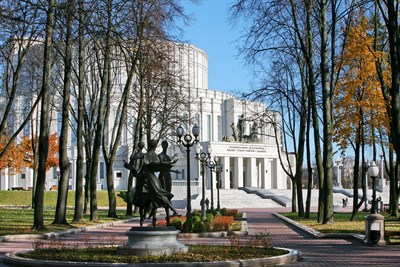
National Academic Bolshoi Opera and Ballet Theatre
The National Academic Bolshoi Opera and Ballet Theatre of the Republic of Belarus was founded in 1933 and reconstructed in 2009. In recent years artists of the theatre have toured over 30 countries. Probably, soon one will hardly find a country on a map not marked with a performance of the Opera and Ballet Theatre of Belarus: from Portugal and Spain to Japan and China, from Norway and Great Britain to Turkey, Thailand – the theatre has found its devoted admirers all over the world. Opera “Nabucco” by J. Verdi, “Tosca” by G. Puccini, “Snow Maiden” of Rimsky-Korsakov, “Chopiniana” to music by F. Chopin, “Tristan and Isolde” to music of Wagner, "Sylphide" by Levenshold became notable theatre first nights.
Address: 220029, Minsk, Parizhskaya Kommuna Sq, 1.
Buses - № 24, 38, 57, 91 till the bus stop "Opera theatre".
Trolley-buses - № 12, 29, 37, 40, 46, 53 till the bus stop "Operatheatre".
Underground - station “Nemiga”.
Belarusian State Circus
Famous Belarusian State Circus is extremely popular among tourists and his history dates back to 1884. The first in the USSR permanent stone circus with 1666 sitting places, which was built after the Revolution of 1917. It’s the only circus in the world situated in the centre of the capital of the state in the main street and the only circus in the world adapted for all circus-genre performances and keeping all types of animals including sea animals.
Address: 220030, Minsk, Nezavisimosti Ave., 32, +375 (17) 327-78-42.
Museums
Belarusian State Museum of the History of the Great Patriotic War
This museum is devoted to the history of the World War II. It was opened on 7 November 1944, when there still were battles.
The exposition of the Museum is located in 30 rooms and represented by 80,000 unique exhibits: an extensive collection of documents and photographs, weapons, used by armed forces of the regular army and partisan units, including home-made guns, etc.
The diorama of a concentration camp Maly Trostenets, the third largest in Europe, is presented there.
Belarusian National History and Culture Museum
Minsk, Karl Marx Str., 12, tel. 227-43-22.
The Museum presents archeological, ethnographic, numismatic, military-historical collections, as well as collections of ancient books and manuscripts, icons, religious clothes, works of folk art. You will see the objects of primitive art and works of high art of medieval culture – the world-famous Slutsk belts, altar gate, items made of porcelain.
Estate museum Dudutki
The only museum of material culture in Belarus. It is located in 40 km from Minsk, on the picturesque bank of the river Ptich.
Here you can spend time in a new and exciting way, experience the atmosphere of the Belarusian province of the 19th century, get acquainted with a way of rural life, grasp the meaning of folk customs and the secrets of ancient crafts.
National Art Museum of the Republic of Belarus
Minsk, Lenin Str., 20.
Permanent exhibition: the Ancient Belarusian art, including icons, wooden sculpture, works of applied art; the Belarusian art of the 16th to 20th centuries; Russian painting of the 18th - 20th centuries.
Thematic exhibitions and chamber music concerts are held (2 times a month). Open: from 11.00 till 18.00. Closed on Tuesday.
Museum of Ethnography and Folklore of the Academy of Sciences
The Museum is located in the centre of Minsk. It hosts a permanent exhibition of works of ancient Belarusian art – icons, ancient wooden sculpture, traditional weaving, including Slutsk belts, the richest in Belarus collection of Belarusian folk costumes from different regions of the country, articles of straw, ceramics, wood carving and other exhibits.
Open: from 11.00 till 18.00.Closed on Wednesday.
Botanical Garden of the Academy of Sciences
We recommend visiting the Botanical garden, located in the centre of Minsk, founded in 1932. Virtually all the flora characteristic for Belarus is represented there.
Open: May - October; from 10.00 till 19.00.
Museum Of Modern Fine Art
Minsk, Nezvisimosti Ave., 47. Open: from 11.00 till 19.00.
There is no permanent exposition. It is used for exhibitions of Belarusian and foreign artists.
Belarusian State Museum of Folk Architecture
Minsk, Ozertso Village. Open daily, except Mondays, from 10.00 till 17.00.
There is a constant exposition, at which native Belarusian household items as well as the peculiarities of folk architecture are presented. Folk festivals and celebrations are regularly held there. It is located 4 km away from Minsk. Official website: etna.of.by
State Museum of History of Music and Theatre of Belarus
Minsk, Starovilenskaya Str. Open daily, except Saturdays and Sundays, from 9.00 till 18.00.
There is no permanent exposition. Periodically updated exhibitions, related to music and theater are held there.
A. Bembel Museum of Contemporary Sculptures
Minsk, Yakub Kolas Str., 29. Open daily from 10.00 till 19.00.
In addition to the permanent exhibition there is an exhibition of young Belarusian sculptors, who have already won the recognition of the public.
Museum of Nature and Ecology of Belarus
Minsk, Karl Marx Str., 12. Open daily, except Wednesday, from 11.00 till 19.00.
There is a permanent exposition that reflects animal life of Belarus.
State Museum of History of the Belarusian Literature
Minsk, M.Bogdanovich Str., 15.
Open daily except Monday, from 10.00 till 17.00
There are several exhibitions at the same time, designed to acquaint visitors with the peculiarities of the Belarusian literature and its history.
Museum of Physical Culture and Sport
Minsk, Nezavisimosti Str., 51. Open daily, except Saturday and Sunday, from 9.00 till 17.00
There’s a permanent exposition, reflecting the history and achievements of Belarusian sport.
Shopping
Minsk has numerous shopping malls in every district where you can buy both food and consumer goods including souvenirs with World Championship symbols.
The largest shopping malls are located, mainly, in the centre of the city: Nezavisimosti Avenue, Nemiga Street, the area of the underground station “Yakub Kolas Square”, Pobeditelei Avenue.
Several large shopping malls are located in the immediate proximity to the places of the competition were built on the eve of the World Championship.
Shopping malls with well-known brands include Korona, Arena City, ALL, ProStorе, BIGZZ, Expobel and others. Their parking lots are designed for a large number of cars, so it is very comfortable to go for shopping.
Also a lot of products with symbols of the championship can be bought in the most famous Minsk department stores: GUM, TSUM, Belarus and the Trading House Nemiga.
The popular underground shopping complex Stolitsa is located in the centre of the city where you can not only do shopping but also relax at the cafe. It is favorably distinguished by a multi-storey underground parking.
Arena City, Pobediteley, 84
Nemiga, Nemiga Str., 3
TSUM, Nezavisimosti Ave., 54
Stolitsa, Nezavisimosti Square
Trading House Nemiga, Nemiga Str., 8,10
Maximus, Kalvariyskaya Str., 24
Belarus, Zhilunovicha Str., 4
BIGZZ, Borovaya 5
GUM, Nezavisimosti Ave., 21
Expobel, Borovaya 5
ProStore, Dzerzhinsky Ave., 126
Riga, Surganova Str., 50
ALL, Dolginovsky Tract, 178
Transportation
Belarus is located on the border with the European Union and connects Western Europe with Russia. So you can easily get to Minsk by train, plane, bus or car.
PLANE. The national airport of Minsk is located 40 kilometres from the city. Flights to many cities worldwide are operated by the national airline Belavia and air carriers from other countries. www.belavia.by
Shuttles from the airport to Minsk run every hour. If you decide to take a taxi, the fare to the city center will cost 25-30 euros.
TRAIN. All trains arrive and depart from the main railway station, located in the city centre. You can find the schedule, make reservations and purchase tickets online by visiting the official website of the Belarusian Railways: www.rw.by (in Russian)
BUS. Full details of the international bus service is available on the website of the public carrier Minsktrans: www.minsktrans.by (in Russian)
Transportation in Minsk
Public transport in the city starts at 5:30 in the morning and ends at 1:00 at night.
A one-way ticket for bus, trolleybus and tram is available at street stalls (at bus stops) and shops. It can be purchased from the driver or the ticket collector as well. Tickets must be validated immediately after boarding the mean of transport.
An underground (Metro) ticket is a token or a plastic card that can be purchased at the box office in the station. A ticket costs approximately $0.25 per ride. There are two underground lines in Minsk.
Taxis can be found near hotels, railway stations, airports and on the streets of the city. Credit cards are not accepted in taxis.
Emergency Phone Numbers
101 – Fire Brigade
102 – Police
103 – Ambulance
Transport
Bus terminal information service: 114
Railway terminal information service: 105, 225 54 10
Airport information service: 106,186
Railway reservation: 151
Airline reservation: 206 67 95
Bus reservation: 227 40 83
Call a taxi: 135, 107, 152, 157,161, 181, 184
Emergency Dispatch Services
Minsk Executive Committee on-call service: 227 44 33
Minsk Executive Committee operator: 165
Underground Railway System operator: 200 77 74
Road Police on-call service: 222 08 29, 222 17 17
Police on-call service: 222 73 01, 227 02 21
Emergency service on roads: 135, 116, 107
Rescue Unit of the Emergency Ministry: 275 29 01
Accidents registration bureau: 229 46 46
Minsk City Telephone Network
Emergency Service: 210 22 93
Paid information: 109
Information about medical institutions: 199
Minsk City Info Service (paid information): 190
International Calls Order: 171
Codes (regional and international): 153
Information on payment for telephone conversations for individuals: 164
Receiving of telegrams and commercials: 166
Miscellaneous
Time call minder: 188
Weather call minder: 195
Pharmacy inquiry office: 169
Medical reference information service (paid): 8 902 101 05 05
Paid medical services: 103, 159, 160
Consumer service information: 167
Cinema information service: 191
Night-time clubs: 192
Night-time shops: 193
Arenas
The games of the 2014 IIHF Ice Hockey World Championship will be held at two venues in Minsk: The Minsk Arena (inaugurated on 30 January 2010, capacity for 15,000 spectators) and the Chizhovka Arena (to be put into operation in November 2013, capacity for 9,600 spectators).
Minsk Arena
The Minsk Arena is one of the most capacious ice rinks in Europe. Its grand opening was held on 30 January 2010 as part of the Kontinental Hockey League’s All-Star Game.
The Minsk Arena is a unique sports complex. It is second to none in the country by the multifunctionality, complexity of technical solutions, systems and equipment. The building has a roof made by modern technology, which was implemented in Belarus for the first time. Virtually every square centimetre of the roof is filled with sensors, which provides for 24/7 monitoring of cables’ tension. This information comes to Minsk Arena employees and specialists in France.
Part of the lower tier of the stands with metal steps and seats can be moved under concrete steps with one click. Commentator cabins and 42 VIP boxes for 700 seats below are located on the upper tier. Two governmental and a presidential box are located on the grandstand A.
A standard international ice hockey sheet of 60 x 30 metres is in the centre of the arena. The central arena is connected with a speed skating arena by an underground passage.
The building is equipped with 54 cloakrooms so that 15,000 spectators can leave the complex within 40 minutes after an event.
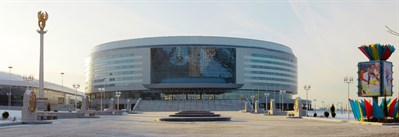
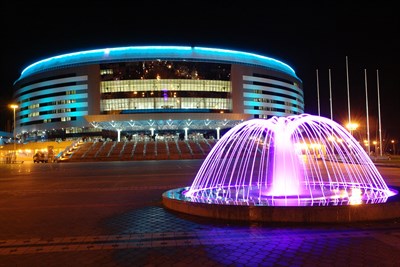
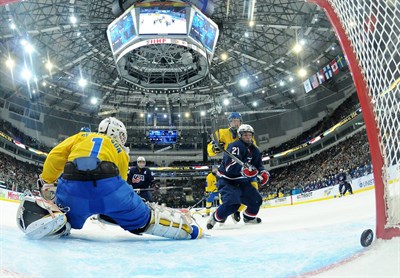
Chizhovka Arena
The Chizhovka Arena is a multifunctional sports and entertainment complex, which will be the second venue of the 2014 IIHF Ice Hockey World Championship. The arena is located in the south of the city in the district of Chizhovka, on the shore of the same-named reservoir and on the territory of “The Park of the 900th Anniversary of Minsk”. The completion of construction works is scheduled for November 2013. The complex envisages a large sports and entertainment arena for 9,600 spectators, a small practice rink, halls for various sports and a place for recreation and leisure.
The main purpose of a large arena is the holding of ice hockey games. A small arena is designed for training of professional athletes and students of youth sports schools, as well as for mass skating.
Each arena will have its own cooling station and the cooling system of ice fields. A media centre, a meeting room and an area for leisure and entertainment with a bowling room, a billiard room, saunas, cafes and restaurants will be located between the arenas.
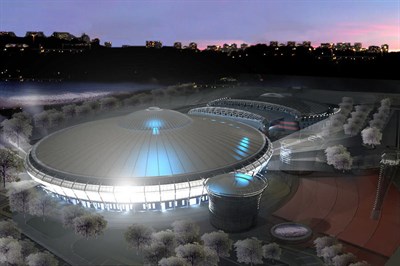
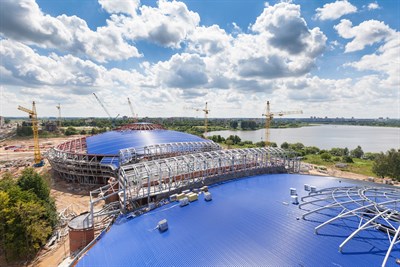
Tickets
The first stage of ticket sales for the 2014 IIHF Ice Hockey World Championship in Minsk, Belarus, started on 30 September 2013.
Tickets can be bought online on www.ticketpro.by, and at Ticketpro outlets. Click here to see the list of all sales points in Belarus.
Championship venues
| Minsk Arena | Chizhovka Arena |
| Seating capacity: 15,000 | Seating capacity: 9,600 |
| - 28 Preliminary Round games | - 28 Preliminary Round games |
| - 2 Quarter-Final games | - 2 Quarter-Final games |
| - 2 Semi-Final games | |
| - Bronze Medal Game | |
| - Gold Medal Game |
Game Categories and ticket prices
Prices for single-game tickets will depend on the participating teams and the starting time of the game.
The ticket price for preliminary-round games will range from 6 to 50 Euro; the price for a ticket in the final round starts from 25 Euro.
Click here for an Excel file with all prices (in Euro).
Types of tickets
1. Event Package
First on sale will be ticket packages that include all games played at one of the championships venues. It is a great offer for dedicated hockey fans.
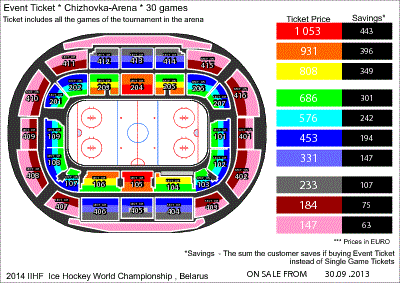
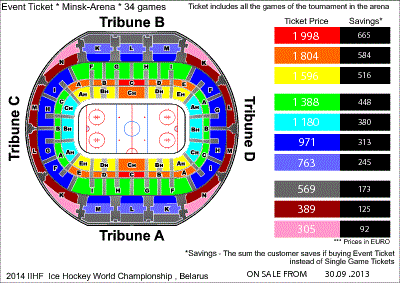
2. Preliminary Round / Final Round Package
As of 14 October packages for all preliminary-round games at one venue as well as one for the final round at Minsk Arena will be on sale.
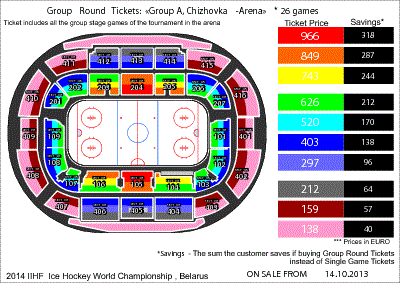
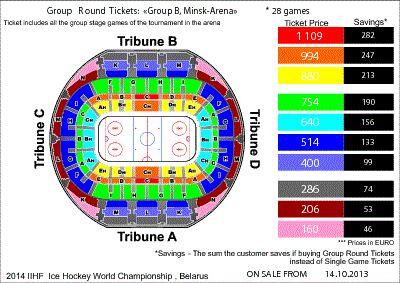
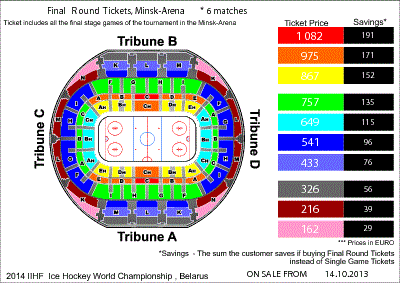
3. Team Package
As of 28 October packages will be on sale for all seven preliminary-round games of a national team.
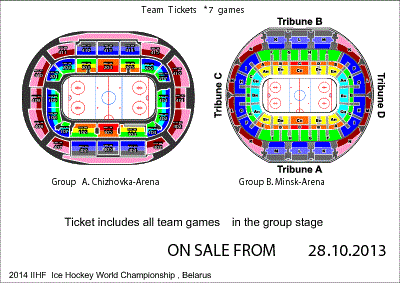
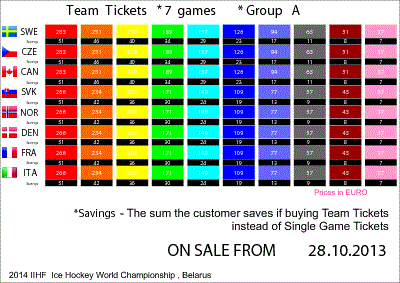
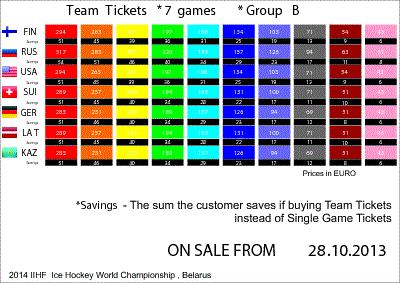
4. Day Tickets
Ticket for one game day at a venue that include two or three games will go on sale on 11 November.
5. Single-Game Tickets
Tickets for single games including quarter-finals, semi-finals and the medal games will go on sale on 25 November.
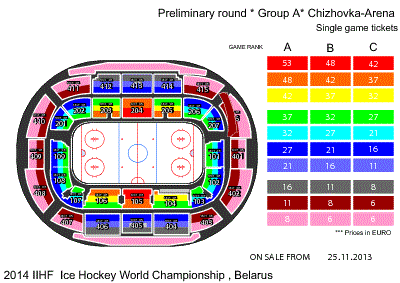
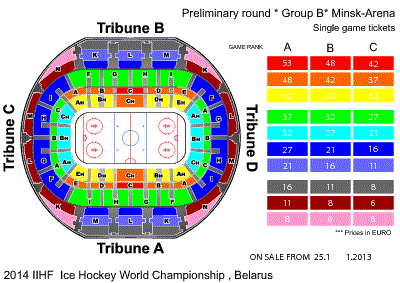
Note: The ticket sales operator has the right to charge a service fee of up to 10%.
Payment options
Tickets can be paid as follows:
- iPay – use the balance of your MTS or Life:) account
- Credit card (Visa, MasterCard)
- System “Raschet” (ERIP, unified pay and informational field) – pay at your convenience in any payment office
- Digital cash (WebMoney, EasyPay)
- Cash acceptance network through Self-service teller ОСМР (QIWI)
Payment for tickets within the territory of the Republic of Belarus will be carried out in Belarusian rubles.
Information for foreign citizens
The procedure and conditions of ticket sales are already established on the territory of the Republic of Belarus as well as their usage by foreign citizens and persons without citizenship for the entry to Belarus, exit from Belarus and temporary stay on the territory of the country from April 25 till May 31, 2014.
A ticket grants the right to attend a specified (in ticket) game of the championship.
Presenting only one ticket, copy of electronic ticket or certificate together with a passport, foreign citizens and persons without citizenship can cross the border of the Republic of Belarus once.
Ticket owners should present the tickets on the border both while entering and leaving from the territory of the Republic of Belarus.
Types of tour packages
“CentreKurort” acts as an official tour operator of 2014 IIHF Ice Hockey World Championship and has an exclusive right to sell tour packages.
Such packages as the VIP Package, Fan Package, Family Package, and Group Tours include not only tickets for games but also accommodation, fans’ travel passes, transfers, city tours and other services.
1. VIP package:
- basic services: accommodation (best 4-5 star hotels in Minsk), game ticket or ticket package (central seats at tribunes A and B), access to the VIP Hospitality zone (restaurant) at the venues, transfer from hotels to the venues;
- additional services: sightseeing, individual transfers, etc.
2. Family package: for married couples with children (discount on child’s accommodation and tickets is up to 50 %); accommodation is optional:
- basic services: accommodation (package with accommodation), game tickets or ticket package, entertainment program for children for one hour before a game;
- additional services: sightseeing, individual transfers, etc.
3. Fan package:
- basic services: accommodation at the fan village and hotels in Minsk, game ticket or ticket package;
- additional services: sightseeing, individual transfers, etc.
4. Student’s package: students’ loyalty program (discount on accommodation and tickets is up to 50 %), without accommodation (one-day program) or with accommodation (two-day program):
- basic services: accommodation at the fan village or hostels in Minsk (package with accommodation), ticket or ticket package for morning and/or afternoon games, access to the fan village hospitality zone (disco, concert venue).
- additional services: sightseeing, meals, etc.
5. Hockey for children (school groups): loyalty program (discount on accommodation and tickets is up to 50 %), without accommodation (one-day program) or with accommodation (two-day program):
- basic services: accommodation at the fan village or hostels in Minsk (package with accommodation), ticket or ticket package for morning and/or afternoon games, meals, sightseeing, entertainment program for children during one hour before a game.
6. Corporate package: loyalty program for groups of employees of Belarusian enterprises and organizations (discount on accommodation and tickets is up to 25 %), without accommodation (one-day program) or with accommodation (two-day program):
- basic services: accommodation at the fan village or hostels in Minsk (package with accommodation), ticket or ticket package for morning and/or afternoon games, sightseeing.
- additional services: meals, etc.
Detailed information about tour packages can be found on the tour operator website http://icehockey-2014.com/en/.
You can make a pre-order by sending an e-mail to hockey@ck.by or by fax (+375-17) 222-62-58.
Skyboxes
Skyboxes will be sold on preliminary requests. The sales start in September 2013.
All orders should be submitted to the Organizing Committee of the 2014 IIHF Ice Hockey World Championship. Click here for the contacts.
Hotels
Fans travelling to Minsk can contact the company CentrKurort for accommodation requests during the 2014 IIHF Ice Hockey World Championship.
Website: http://icehockey-2014.com
CentrKurort is the biggest tour operator in Belarus. It is a part of the Presidential Property Management Department.
Today CentrKurort is not only the largest state tourist organization in the country, but also a famous brand in Belarusian tourism.
In January 2012 a tender for the official tour operator of the 2014 IIHF Ice Hockey World Championship in Minsk was issued which was won by CentrKurort.
CentrKurort is actively preparing for this event, creating the necessary base, forming professional staff to provide the participants and guests of the World Championship with real European hospitality and Belarusian comfort.
14 hotels will provide accommodation for official participants of the World Championship.
Tourists will be accommodated in city hotels, hotels based at sports and recreation facilities of district in Minsk and Logoisk, and university hostels.
The reconstruction of a number of hotel complexes is planned within the framework of the preparation for the event.
«Europe» * * * * *
Minsk, 28 Internatsionalnaya Str.
+375 17 229 83 33
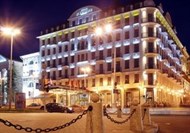
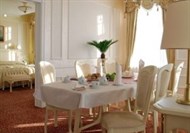
«President Hotel» * * * * *
Minsk, 18 Kirova Str.
tel.: +375 17 229 7 000/003/111
fax.: +375 17 229 7 006
president-hotel@pmrb.gov.by
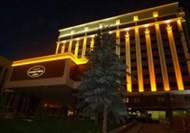
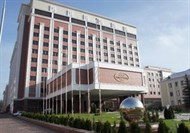
«Crowne Plaza Minsk» * * * * *
Minsk, 13 Kirova Str.
+375 17 218 34 00
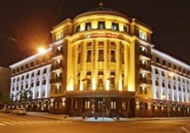
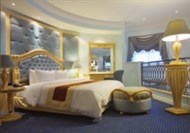
«Victoria» * * * *
Minsk, 59 Pobeditelei Ave.
+375 17 239 77 44
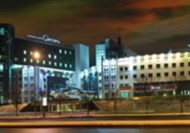

«Minsk» * * * *
Minsk, 11 Nezavisimosti Ave.
+375 17 209 90 80
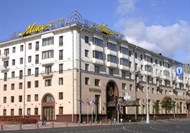
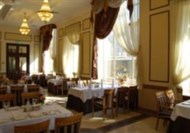
«The Robinson Club» * * * *
Minsk district
Route Minsk-Molodechno, turn on Adolescence, 7 km from Minsk
Hotel info-center:
+ 375 (44) 502-13-33
+ 375 (17) 502-13-33
reception@robins.by
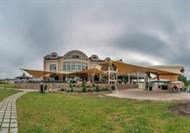
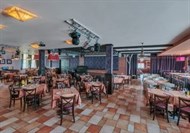
«Garni» * * *
Minsk, 11 Internatsionalnaya Str.
+375 17 229 76 00
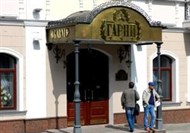
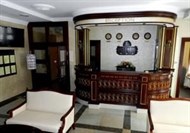
«Belarus» * * *
Minsk, 15 Storozhevskaya Str.
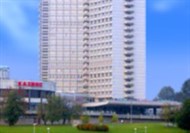
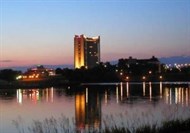
«Student village»
Minsk, Dzerzhinskogo pr., Metro Station Petrovshina
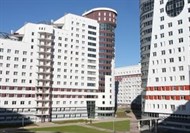
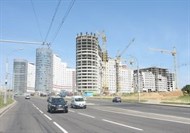
Visa & Customs
A visa-free regime will be in place for the official participants of the 2014 IIHF Ice Hockey World Championship and foreign tourists for the period from 25 April until 31 May 2014.
For the official participants a listing in the 2014 IIHF Ice Hockey World Championship accreditation system will become the basis for a visa-free entry in the territory of Belarus.
An original or electronic ticket to a game of the 2014 IIHF Ice Hockey World Championship will become the basis for a visa-free entry in the territory of Belarus for tourists.
Presenting a ticket, copy of electronic ticket or certificate together with a passport, foreign citizens and persons without citizenship can cross the border of the Republic of Belarus once.
Ticket owners should present the tickets on the border both while entering and leaving from the territory of the Republic of Belarus.
Please be aware that in case of transit traffic through the territory of the Russian Federation to the games of the World Championship in Belarus, foreign tourists need to have a valid visa for the Russian Federation.
Customs
The main document regulating the movement of goods for personal use is the agreement on the movement of goods for personal use by individuals across the customs border of the Customs Union and customs operations connected with their release (herein – the Agreement). The document is aimed at implementing the provisions of Chapter 49 of the Customs Code of the Customs Union.
The Republic of Belarus, the Republic of Kazakhstan and the Russian Federation have adopted the most preferential terms in respect of duty-free import limits.
Thus, the limit for duty-free import of personal effects, both in accompanied and unaccompanied luggage, is €1500, with the total weight of 50kg. One should not be confused, however, that the amount of 50kg of homogeneous goods is allowed for the import. The intended purpose of goods is still determined by the customs authorities taking into account the statement of an individual, the nature and quality of goods as well as the frequency of crossing the customs border of the Customs Union by an individual and/or the goods.
In line with the Agreement, duty-free concessions cover alcoholic beverages and beer of not more than 3 litres inclusive, and 200 cigarettes or 50 cigars (cigarillos) or 250 g tobacco, or the abovementioned goods in assortment with the total weight under 250 g Alcoholic beverages, beer, tobacco and tobacco products can be imported by individuals over 18 years old. If the import of alcoholic beverages and beer exceeds 3 litres, customs duties are charged at a flat rate of €10 per 1 litre in excess of duty-free concession; the import of more than 5 litres is prohibited. The same rules are applied to tobacco and tobacco products imported in excess of duty-free allowances.
As compared with the Provision on concessional transportation of goods for personal use across the customs border and their simplified clearance approved by Belarus President’s Decree No 503 of 15 October 2010 (herein – Provision), which norms are currently applied in the part that does not contradict the Customs Union legislation, the Agreement eliminates quantity restrictions on the import of jewelry and food products. The abovementioned categories of goods are allowed for the import under general limits (50kg and €1500).
The official participants of the championship (foreign physical persons) may import goods meant for the competition without any customs payment.
All the goods except for excisable goods imported to the territory of the Republic of Belarus for the 2014 IIHF Ice Hockey World Championship shall be exempted from import customs duties in accordance with international obligations of the Republic of Belarus and value-added tax.
The confirmation of designated use of goods from the organizing committee, which contains the information about the range, quantity, price of goods and importing organizations, is the basis for exemption of customs payments.
In accordance with the decision of the Commission of the Customs Union sports gear and equipment and other goods intended exclusively for the use during the preparation and holding of official international sport events are placed under special customs procedure without payment of customs duties, taxes and without application non-tariff regulation measures.
Detailed information are available on the website of the State Customs Committee of the Republic of Belarus.
Road Toll
Starting from 1st August 2013 the new electronic toll collection system BelToll has been put into operations on the roads in Belarus.
The toll is charged on the following roads:
- М-1/Е 30 – Brest – Minsk – Russian border
- M-2 Minsk – National Airport Minsk
- M-3 Minsk – Vitebsk
- M-4 Minsk – Mogilyov
- M-5/E 271 Minsk – Gomel
- M-6/E 28 Minsk – Grodno – the Polish border
The use of the BelToll system is mandatory for the drivers of:
- vehicles with maximum laden weight of less than 3.5 tons if registered outside of the Customs Union;
- vehicles with maximum laden weight of over 3.5 tons despite the country of registration.
Drivers of vehicles with maximum laden weight less than 3.5 tons registered in a member country of the Customs Union will be not liable to pay the toll fee.
Tariffs for the passage along the Belarusian toll roads are set depending on maximum laden weight of a vehicle:
- vehicles with a maximum laden weight of less than 3.5 tons - €0.04 per km;
- 2-axle vehicles with a maximum laden weight of over 3.5 tons - €0.08 per km;
- 3-axle vehicles with a maximum laden weight of over 3.5 tons - €0.10 per km;
- 4-axle (and more) vehicles with a maximum laden weight of over 3.5 tons - €0.12 per km.

For using the toll roads network in Belarus, you should address the BelToll Customer Service Point and get a special device – On-Board Unit – upon payment a deposit. For your convenience, Customer Service Points are located near the cross border points and along the toll roads.
Upon receipt of an On-board Unit you should make an advance payment for the use of toll roads which should be not less than 25 EUR. The payment could be made only in Belarusian rubles (by cash, by bank card or fleet card).
When leaving the territory of Belarus, you can return your on-board unit at any Customer Service Point. The deposit will be refunded if the on-board unit is operating and not damaged.
Attention!
If the windscreen of your car is metallized or has a solar reflection, you should consult your car manufacturer in advance regarding the recommended mounting location for the on-board unit on the windscreen.
Additional information:
www.beltoll.by
Call Centre + 375 172 798 798
Mascot
The mascot VOLAT was selected in a contest in Belarus.
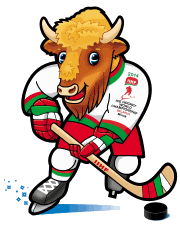 VOLAT is a bison – one of the symbols of Belarus. The animal reflects peculiarities of the national culture and corresponds to the ice hockey game. It demonstrates strength and power and has a clear message to millions of fans and spectators all over the world. It also arouses bright and positive associations.
VOLAT is a bison – one of the symbols of Belarus. The animal reflects peculiarities of the national culture and corresponds to the ice hockey game. It demonstrates strength and power and has a clear message to millions of fans and spectators all over the world. It also arouses bright and positive associations.
289 mascot names were proposed by Belarusian citizens at the first stage of the contest. The jury selected ten names that entered the online poll.
The name VOLAT received most votes in the poll. 859 out of 3,578 fans participating in the poll chose this name. The poll was run between 10 and 20 April 2013 on the websites www.talisman2014.by and www.hockey.by.
The jury members noted that VOLAT is a beautiful name that sounds similar in all languages and will be easy for tourists to spell and pronounce.
VOLAT comes from Old Slavonic and has important meanings. It is a character from East Slavonic mythology. According to legends, Volats – tall and strong men – lived in the old days and were buried in long barrows called Volotovki. There are also the names of settlements in north-east and central Belarus like Volaty and Volotovki that are associated with VOLAT in folk traditions.
The results of the poll:
1. Volat 859
2. Belovezhik 619
3. Rasti 514
4. Vezhik 287
5. Zubryk 328
6. Pushik 221
7. Yanka 253
8. Bully 240
9. Zuby 146
10. Shaibik 111
The winners of the contest (who proposed the name VOLAT) are:
Matskevich Maria Sergeyevna (Minsk)
Kravchenko Leonid Vasilyevich (Senno, Vitebsk Region)
They will be awarded with certificates and valuable gifts (tickets for the opening ceremony of the 2014 IIHF Ice Hockey World Championship).
Fan Zones
The fan zones are festive territories where you can spend quality time before attending a hockey game.
The fan zones are not just places. First of all, it's the communication of all the fans around the world who share the interest for ice hockey.
There will be two fan zones at the 78th IIHF Ice Hockey World Championship in Minsk. Both will be located directly near the arenas.
Action in the fan zones is not limited to the broadcast of the games on big screens. It will be developed in the context of other festive, cultural and sport events.
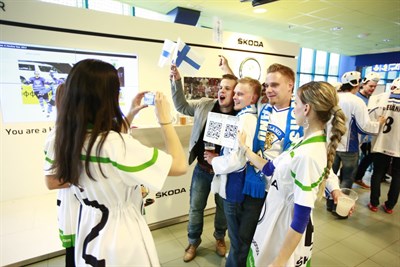
The fan zones will include: a stage, concert venue, shops with souvenirs, the territory of the sponsors and partners of the championship, mini-playgrounds for mini-tournaments and competitions among fans, cafes, restaurants, shopping areas and tents, shops with hockey merchandise and many other things.
The fan zones will be permanent venues and will not be transferred to a different place.
They will be accessible for hockey fans of different ages and will have social activities such as sports mini-tournaments, sessions with prominent Belarusian hockey players, meeting the bison Volat – the mascot of the 2014 IIHF Ice Hockey World Championship –, performances of famous artists, demonstration of paintings on the sporting themes, exchange of gifts and many other things.
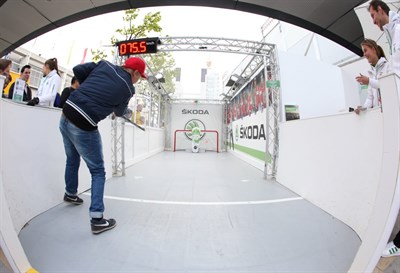
The fan zones are a great idea for active leisure and support of your national team for the first World Championship in history that is hosted in Belarus.
We hope that the citizens of Minsk will create a great atmosphere in the fan zone with fans from all around the world.
A lot of interesting things will also be presented for families and kids at the festival of hockey.
And last but not least: The entrance to the fan zones is for free!
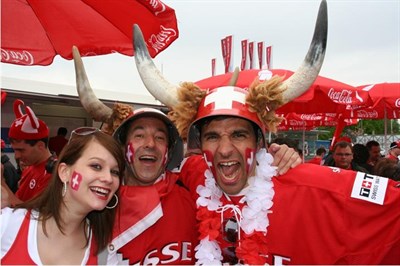
Photos: Andre Ringuette, Jeff Vinnick / HHOF-IIHF Images, 2009 IIHF World Championship Organizing Committee
TV Listings
The 2014 IIHF Ice Hockey World Championship will be broadcast in over 100 countries and territories.
Click here for the list of broadcasters.
Past Medallists
| IIHF Ice Hockey World Championships | ||||
| Year | Gold | Silver | Bronze | Venue |
| 1920 | Canada | USA | Czechoslovakia | Antwerp (Olympics) |
| 1924 | Canada | USA | Great Britain | Chamonix (Olympics) |
| 1928 | Canada | Sweden | Switzerland | St. Moritz (Olympics) |
| 1930 | Canada | Germany | Switzerland | Chamonix, Berlin, Vienna |
| 1931 | Canada | USA | Austria | Krynica |
| 1932 | Canada | USA | Germany | Lake Placid (Olympics) |
| 1933 | USA | Canada | Czechoslovakia | Prague |
| 1934 | Canada | USA | Germany | Milan |
| 1935 | Canada | Switzerland | Great Britain | Davos |
| 1936 | Great Britain | Canada | USA | Garmisch-Partenkirchen (Olympics) |
| 1937 | Canada | Great Britain | Switzerland | London |
| 1938 | Canada | Great Britain | Czechoslovakia | Prague |
| 1939 | Canada | USA | Switzerland | Basle, Zurich |
| 1940-1946 No championships (World War II) | ||||
| 1947 | Czechoslovakia | Sweden | Austria | Prague |
| 1948 | Canada | Czechoslovakia | Switzerland | St. Moritz (Olympics) |
| 1949 | Czechoslovakia | Canada | USA | Stockholm |
| 1950 | Canada | USA | Switzerland | London |
| 1951 | Canada | Sweden | Switzerland | Paris |
| 1952 | Canada | USA | Sweden | Oslo (Olympics) |
| 1953 | Sweden | FR Germany | Switzerland | Zurich, Basle |
| 1954 | Soviet Union | Canada | Sweden | Stockholm |
| 1955 | Canada | Soviet Union | Czechoslovakia | Krefeld, Dortmund, Cologne |
| 1956 | Soviet Union | USA | Canada | Cortina (Olympics) |
| 1957 | Sweden | Soviet Union | Czechoslovakia | Moscow |
| 1958 | Canada | Soviet Union | Sweden | Oslo |
| 1959 | Canada | Soviet Union | Czechoslovakia | Prague, Bratislava |
| 1960 | USA | Canada | Soviet Union | Squaw Valley (Olympics) |
| 1961 | Canada | Czechoslovakia | Soviet Union | Geneva, Lausanne |
| 1962 | Sweden | Canada | USA | Colorado Springs, Denver |
| 1963 | Soviet Union | Sweden | Czechoslovakia | Stockholm |
| 1964 | Soviet Union | Sweden | Czechoslovakia | Innsbruck (Olympics) |
| 1965 | Soviet Union | Czechoslovakia | Sweden | Tampere |
| 1966 | Soviet Union | Czechoslovakia | Canada | Ljubljana |
| 1967 | Soviet Union | Sweden | Canada | Vienna |
| 1968 | Soviet Union | Czechoslovakia | Canada | Grenoble (Olympics) |
| 1969 | Soviet Union | Sweden | Czechoslovakia | Stockholm |
| 1970 | Soviet Union | Sweden | Czechoslovakia | Stockholm |
| 1971 | Soviet Union | Czechoslovakia | Sweden | Berne, Geneva |
| 1972 | Czechoslovakia | Soviet Union | Sweden | Prague |
| 1973 | Soviet Union | Sweden | Czechoslovakia | Moscow |
| 1974 | Soviet Union | Czechoslovakia | Sweden | Helsinki |
| 1975 | Soviet Union | Czechoslovakia | Sweden | Munich, Dusseldorf |
| 1976 | Czechoslovakia | Soviet Union | Sweden | Katowice |
| 1977 | Czechoslovakia | Sweden | Soviet Union | Vienna |
| 1978 | Soviet Union | Czechoslovakia | Canada | Prague |
| 1979 | Soviet Union | Czechoslovakia | Sweden | Moscow |
| 1981 | Soviet Union | Sweden | Czechoslovakia | Gothenburg, Stockholm |
| 1982 | Soviet Union | Czechoslovakia | Canada | Helsinki, Tampere |
| 1983 | Soviet Union | Czechoslovakia | Canada | Dusseldorf, Dortmund, Munich |
| 1985 | Czechoslovakia | Canada | Soviet Union | Prague |
| 1986 | Soviet Union | Sweden | Canada | Moscow |
| 1987 | Sweden | Soviet Union | Czechoslovakia | Vienna |
| 1989 | Soviet Union | Canada | Czechoslovakia | Stockholm, Sodertalje |
| 1990 | Soviet Union | Sweden | Czechoslovakia | Berne, Fribourg |
| 1991 | Sweden | Canada | Soviet Union | Turku, Helsinki, Tampere |
| 1992 | Sweden | Finland | Czechoslovakia | Prague, Bratislava |
| 1993 | Russia | Sweden | Czech Republic | Dortmund, Munich |
| 1994 | Canada | Finland | Sweden | Bolzano, Canazei, Milan |
| 1995 | Finland | Sweden | Canada | Stockholm, Gavle |
| 1996 | Czech Republic | Canada | USA | Vienna |
| 1997 | Canada | Sweden | Czech Republic | Helsinki, Turku, Tampere |
| 1998 | Sweden | Finland | Czech Republic | Zurich, Basle |
| 1999 | Czech Republic | Finland | Sweden | Oslo, Lillehammer, Hamar |
| 2000 | Czech Republic | Slovakia | Finland | St. Petersburg |
| 2001 | Czech Republic | Finland | Sweden | Cologne, Hanover, Nuremberg |
| 2002 | Slovakia | Russia | Sweden | Gothenburg, Karlstad, Jonkoping |
| 2003 | Canada | Sweden | Slovakia | Helsinki, Turku, Tampere |
| 2004 | Canada | Sweden | USA | Prague, Ostrava |
| 2005 | Czech Republic | Canada | Russia | Vienna, Innsbruck |
| 2006 | Sweden | Czech Republic | Finland | Riga |
| 2007 | Canada | Finland | Russia | Moscow, Mytishi |
| 2008 | Russia | Canada | Finland | Quebec City, Halifax |
| 2009 | Russia | Canada | Sweden | Berne, Zurich-Kloten |
| 2010 | Czech Republic | Russia | Sweden | Cologne, Mannheim, Gelsenkirchen |
| 2011 | Finland | Sweden | Czech Republic | Bratislava, Kosice |
| 2012 | Russia | Slovakia | Czech Republic | Helsinki, Stockholm |
| 2013 | Sweden | Switzerland | USA | Stockholm, Helsinki |
| Notes: | ||||
| All Olympic Ice Hockey Tournaments between 1920 and 1968 also counted as World Championships. | ||||
| In the Olympic years 1980, 1984 and 1988, no IIHF World Championships were staged. | ||||
| IIHF Ice Hockey European Championships | ||||
| Year | Gold | Silver | Bronze | Venue |
| 1910 | Great Britain | Germany | Belgium | Les Avants |
| 1911 | Bohemia | Germany | Belgium | Berlin |
| 1912 | Championship annulled | |||
| 1913 | Belgium | Bohemia | Germany | Munich |
| 1914 | Bohemia | Germany | Belgium | Berlin |
| 1915-1920 No championships (World War I) | ||||
| 1921 | Sweden | Czechoslovakia | (only two teams) | Stockholm |
| 1922 | Czechoslovakia | Sweden | Switzerland | St. Moritz |
| 1923 | Sweden | France | Czechoslovakia | Antwerp |
| 1924 | France | Sweden | Switzerland | Milan |
| 1925 | Czechoslovakia | Austria | Switzerland | Strbske Pleso, Stary Smokovec |
| 1926 | Switzerland | Czechoslovakia | Austria | Davos |
| 1927 | Austria | Belgium | Germany | Vienna |
| 1929 | Czechoslovakia | Poland | Austria | Budapest |
| 1932 | Sweden | Austria | Switzerland | Berlin |
| Notes: | ||||
| Berlin 1932 was the last separate IIHF European Championship event. | ||||
| European Championships medals were awarded to the European participants of the IIHF World Championships until 1991. | ||||
World Ranking
The 2014 IIHF Men's World Ranking includes the IIHF Ice Hockey World Championships played between 2011 and 2014 as well as the 2014 Olympics.
The IIHF World Ranking is a tool to reflect the long-term quality of the countries' national team programme taking into consideration the results over four years. It is used to determine the seeding in the IIHF Ice Hockey World Championship as well as to determine the seeding and which teams are automatically qualified for Olympic Winter Games. The seeding in Sochi 2014 is based on the 2012 IIHF World Rankings.
Click here for more information on the IIHF World Ranking system.
2014 IIHF Men's World Ranking
| Points | Movement | ||||
| 1. | Sweden | 3990 | 0 | ||
| 2. | Finland | 3955 | 0 | ||
| 3. | Russia | 3915 | 1 | ||
| 4. | Canada | 3850 | -1 | ||
| 5. | Czech Republic | 3745 | 0 | ||
| 6. | USA | 3740 | 0 | ||
| 7. | Switzerland | 3470 | 0 | ||
| 8. | Slovakia | 3445 | 0 | ||
| 9. | Latvia | 3300 | 1 | ||
| 10. | Norway | 3265 | -1 | ||
| 11. | Belarus | 3170 | 4 | ||
| 12. | France | 3165 | 0 | ||
| 13. | Germany | 3125 | -2 | ||
| 14. | Slovenia | 3040 | 0 | ||
| 15. | Denmark | 3005 | -2 | ||
| 16. | Austria | 2950 | 0 | ||
| 17. | Kazakhstan | 2910 | 0 | ||
| 18. | Italy | 2860 | 0 | ||
| 19. | Hungary | 2560 | 0 | ||
| 20. | Ukraine | 2500 | 1 | ||
| 21. | Japan | 2470 | 1 | ||
| 22. | Great Britain | 2450 | -2 | ||
| 23. | Korea | 2415 | 0 | ||
| 24. | Poland | 2355 | 1 | ||
| 25. | Netherlands | 2305 | -1 | ||
| 26. | Lithuania | 2170 | 0 | ||
| 27. | Romania | 2075 | 0 | ||
| 28. | Croatia | 2010 | 2 | ||
| 29. | Estonia | 1985 | -1 | ||
| 30. | Spain | 1810 | -1 | ||
| 31. | Serbia | 1740 | 0 | ||
| 32. | Israel | 1530 | 1 | ||
| 33. | Mexico | 1530 | -1 | ||
| 34. | Australia | 1300 | 0 | ||
| 35. | Iceland | 1295 | 0 | ||
| 36. | Belgium | 1215 | 0 | ||
| 37. | New Zealand | 1070 | 0 | ||
| 38. | China | 980 | 0 | ||
| 39. | Bulgaria | 870 | 0 | ||
| 40. | South Africa | 845 | 1 | ||
| 41. | Turkey | 840 | -1 | ||
| 42. | Luxembourg | 695 | 1 | ||
| 43. | DPR Korea | 675 | 2 | ||
| 44. | Ireland | 410 | -2 | ||
| 45. | United Arab Emirates | 405 | 2 | ||
| 46. | Greece | 360 | -2 | ||
| 47. | Georgia | 355 | 1 | ||
| 48. | Hong Kong | 260 | new | ||
| 49. | Mongolia | 260 | -3 |
Hall of Fame Induction
Brilliant performance under historic pressure as well as long-lasting excellence is recognized as the IIHF Hall of Fame inducts former players and a builder.
Vyacheslav Bykov, Andrei Khomutov, Nicklas Lidström, Ruslan Salei, Steve Yzerman as players and builder Murray Costello will be inducted in 2014.
Dr Mark Aubry will receive the Paul Loicq Award for his contributions to international hockey.
The IIHF Historical Committee and its chairman, IIHF President René Fasel, have announced the 18th class of the IIHF Hall of Fame to be ceremonially inducted during the 78th IIHF Ice Hockey World Championship in Minsk.
Click here for a complete list of all honoured members since the IIHF Hall of Fame was introduced in 1997. It now boasts 195 greats from 23 countries.
2014 IIHF Hall of Fame Inductees
Players’ Category:
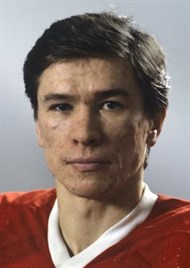 Vyacheslav Bykov (RUS)
Vyacheslav Bykov (RUS)
Born: Chelyabinsk, Soviet Union (Russia), 24 July 1960
Small but remarkably skilled, Vyacheslav (Slava) Bykov was a great passer and team leader during the Soviet Union’s final days of dominance in the latter part of the 1980s and early ‘90s.
In truth, it’s not very often a team’s second line can be said to be better than the first line of most nations, but in the 1980s the nearly unbeatable Soviet Union had a threesome featuring Slava Bykov, Andrei Khomutov, and Valeri Kamenski. Although the three played behind the famed KLM line of Vladimir Krutov, Igor Larionov, Sergei Makarov, all of whom have been inducted into the IIHF Hall of Fame earlier, the Bykov line was, in many ways, equally impressive.
Bykov’s rise to the national team was unexpected, shocking even. At the tender age of 15 he was already a star with the adult team which played in the lower league of Soviet hockey. His talents were duly recognized, and in 1980 he started playing for Traktor Chelyabinsk, not a team with the same pedigree as CSKA Moscow, for instance.
But Bykov was such a fluid skater and master stickhandler that Red Army coach Viktor Tikhonov became quickly impressed. By 1982, Bykov was with Tikhonov’s Red Army team, and at the end of that first season he was helping the mighty Soviets to a 9-1-0 record to win a gold medal at the 1983 World Championship in West Germany.
Tikhonov partnered the centreman Bykov with winger Khomutov, and the pair had a chemistry not often seen on a sheet of ice. In poetic style of the day, the two zig-zagged and criss-crossed their way across the rink, always knowing where the other was, always connected by a seeming umbilical cord that only the most kindred of spirits share.
The line was complete in 1986 when Kamenski, then 20, joined the national team. The Soviets won gold at the 1986 World Championship and continued to dominate over the next half decade and more. In all, Bykov won five World Championship gold to complement Olympic gold in 1988 and 1992. He captained the latter victory, in Albertville, and also wore the “K” for the national team at three WM—1990, 1993, and 1995.
Bykov was also part of the historic Soviet Union team that faced Canada in the best-of-three finals of the 1987 Canada Cup, a series Tikhonov later called the “best three hockey games ever played.” Bykov had a goal and two assists in game two, including a goal and assist in the third period to send the game into overtime.
These years were also a time of massive political change in Bykov’s homeland. The Soviet Union came crumbling down, and a new Russia and group of independent countries emerged. While the KLM line (and Kamenski) all left for the NHL, Bykov and Khomutov decided instead to play in Switzerland. It was there Bykov played, first with Freiburg-Gotteron and later Lausanne, for the last ten years of his career before retiring in 2000. (Khomutov retired in 1998.)
Bykov later turned to coaching and assumed duties of the national team. He coached the Russians to a gold medal in 2008, the Centennial anniversary of the IIHF, defeating Canada in Quebec City in overtime. Incredibly, it was the first gold for Russia since 1993, when Bykov, as a player, had captained the team to victory. He also coached CSKA Moscow and Salavat Yulayev Ufa, the latter winning the KHL’s Gagarin Cup in 2011.
Bykov’s son, Andrei, has played in Freiburg since 2005, completing another circle in the legend’s life as he goes from player to coach to parent to IIHF Hall of Famer.
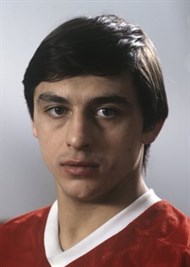 Andrei Khomutov (RUS)
Andrei Khomutov (RUS)
Born: Yaroslavl, Soviet Union (Russia), 21 April 1961
It’s almost impossible to think of Slava Bykov without Andrei Khomutov or Khomutov without Bykov. A year younger than Bykov, right winger Khomutov was perhaps the more purely talented player of the two and a more obvious prospect from his teenage years. But make no mistake, they were a pair. While Bykov was hardly a star in his early days, Khomutov played at the 1981 U20 and later that year appeared in his first World Championship games while still only 19 years of age.
Khomutov joined the mighty CSKA Moscow as a teenager after spending years with junior clubs in the area where he was born, along the Volga river, in Yaroslavl and Gorky (now Nizhny Novgorod). The Soviets won gold in 1981 in Sweden, and Khomutov had his first of seven gold medals over the next decade and a half playing with first the old Soviet Union and later the new, modern Russia.
To complete a remarkable hat trick as an international rookie, Khomutov played for CCCP at the 1981 Canada Cup in September, helping the team win the tournament after a one-sided 8-1 victory over the Canadians in the final game at the Forum in Montreal. He then won gold in each of the next three years, the 1982 and ’83 World Championships and the ’84 Olympics in Sarajevo, Yugoslavia.
Tikhonov went out of his way to praise Khomutov and Bykov for their roles in the 1986 World Championship gold, noting that it was “this pair who killed off most of the penalties,” particularly in the deciding game, a 3-2 win over Sweden.
In 1987, Khomutov, at the height of his powers, was arguably the best Soviet player in the Canada Cup. He scored a monumental goal in game one of the finals. Wayne Gretzky had put Canada ahead 5-4 with only 2:59 remaining in the third period, giving Canada what appeared to be another late, winning goal. But just 32 seconds later, Khomutov tied the game and Alexander Semak scored early in the overtime to take a seeming loss into a stunning victory.
While Bykov was the passer, Khomutov was the scorer. He led the 1990 WM with eleven goals and tied for the lead at the 1992 Olympics with seven. In 123 top-level international games over 15 years, Khomutov recorded 45 goals and 97 points, exceptional statistics given the calibre of competition he faced with regularity. Perhaps more incredibly, Khomutov’s teams in 16 tournaments finished first eleven times, second twice, and third twice.
After hanging up his skates in 1998, Khomutov turned to coaching. He guided teams in Swiss NLA and NLB leagues before going back to Russia when he was a head coach in the KHL as well as the national team coach for Kazakhstan.
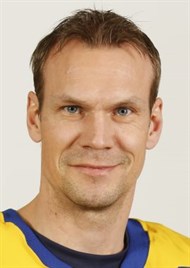 Nicklas Lidström (SWE)
Nicklas Lidström (SWE)
Born: Krylbo, Sweden, 28 April 1970
Everyone knows there’s no such thing as a perfect athlete, but Nicklas Lidström perhaps comes closer than any hockey player to earning such praise. His play on defence for Sweden in IIHF competition and the Detroit Red Wings in the NHL over a period of more than 20 years was staggeringly error-free.
A defenceman who was by no means small, Lidström wasn’t physical so much as he was smart, quick, and disciplined. He rarely was out of position, rarely gave the puck up as the last man back, and rarely committed the kinds of errors that led to goals. After being drafted by Detroit in the 3rd round of the 1989 NHL Entry Draft, Lidström played for Västerås in the Swedish Elite League for two more years before leaving for the NHL. He became an impact player immediately, and the Red Wings never missed the playoffs during his entire career – 20 straight years – a record of success matched only by Larry Robinson.
Because of this NHL success, Lidström played in only three World Championships during his career, winning a medal each time: gold in 1991, bronze in 1994, and silver in 2004. The majority of his international play came in NHL-IIHF events. He played in the first four Olympics involving NHL players, his career reaching its zenith in 2006 when he scored the winning goal early in the third period of the gold-medal game against Finland.
Additionally, Lidström played in the three most recent NHL best-on-best tournaments, namely the 1991 Canada Cup and 1996 and 2004 World Cups of Hockey. His place among the pantheon of greats is further embellished by his incredible NHL accomplishments. He took over the Detroit captaincy from Steve Yzerman in 2006 and two years later became the first European captain to lead his team to the Stanley Cup. The win was the fourth Cup of Lidström’s career. In 2002, he was named winner of the Conn Smythe Trophy, again the first European so honoured.
Lidström was also named winner of the Norris Trophy seven times, putting him in the same rarefied company as Bobby Orr (eight) and Doug Harvey (also seven). As important as all the numbers and awards, Lidström played hockey in a way any fan would admire.
He never fought to play tough, was resilient over two decades, and was positionally as strong as any player in league history. No European has played more games than Lidström – both regular season and playoffs – and his contributions to Tre Kronor and to the NHL make it clear he was one of the most gentlemanly and skilled players ever to skate on a sheet of ice.
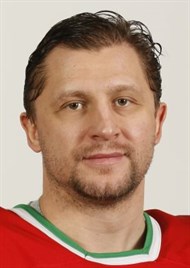 Ruslan Salei (BLR)
Ruslan Salei (BLR)
Born: Minsk, Soviet Union (Belarus), 2 November 1974
Died: Yaroslavl, Russia, 7 September 2011
A defenceman who succeeded at the highest level because of determination and ambition more than natural-born talent, Ruslan Salei was a hero in his native Belarus both for representing his country in IIHF tournaments as well as his lengthy NHL career.
In fact, while virtually every European player gets to the NHL by being drafted first and coming to North America after, Salei was so determined to make it that he wasn’t daunted or intimidated by not being drafted into the NHL when he was 18 and 19 years old.
In 1995, at age 20, he signed a contract to play in the IHL with the Las Vegas Thunder. There were no signs whatsoever that he would make it to the NHL or that any team was interested in his talents, but he got to Las Vegas and played impressively. He was also tough, accumulating 123 penalty minutes and proving his abilities to adapt to the North American game. After just one season Anaheim selected him a lofty 9th overall at the 1996 draft, and the next year saw continued and impressive development.
Salei started in the IHL, moved up to the AHL, and ended up playing with the Mighty Ducks for the last half of the 1996/97 season. His days of minor pro hockey were virtually over, but his international career was only just beginning. Salei played for Belarus at the 1994 and 1995 World Championships when the new nation was in C Pool. They won in ‘95 to move up to B Pool, won again without Salei in 1997 to move up to A Pool, and have been in the top pool continuously ever since (with two exceptions). As a natural leader, Salei has also captained the national team on many occasions.
Belarus has never been one of the top-medal-winning nations, but it has maintained its competitiveness nonetheless. Without doubt the team’s finest result was a 4th-place finish in 2002 at the Salt Lake Olympics, a result that was achieved thanks to a 4-3 win over Sweden in the quarter-finals, the nation’s biggest victory of all time. Salei was one of the best players on ice that game, a defining moment in his career and his country’s hockey history.
Salei played nine seasons with the Ducks, establishing himself as an all-‘round defenceman. Big and tough, he wasn’t afraid to stand up for his teammates. But, he also showed offensive abilities as well, and in 2003 the team went to the Stanley Cup finals before losing to New Jersey in game seven. It was Salei who scored the overtime winner in Game 3, putting Anaheim back in the series after trailing, 2-0.
After signing as a free agent with Florida in 2006, Salei later played for Colorado and Detroit before leaving the NHL in the summer of 2011. He signed with Lokomotiv Yaroslavl of the KHL but perished in the plane crash that killed the entire team. A short time later, he became a first player inducted into the newly-created Belarusian Hockey Hall of Fame, and his number 24 was retired by the Belarusian Ice Hockey Association for international competition.
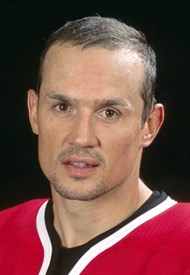 Steve Yzerman (CAN)
Steve Yzerman (CAN)
Born: Cranbrook, British Columbia, Canada, 9 May 1965
Few players in the history of hockey played with the sportsmanship, determination, and remarkable skill as Steve Yzerman. And fewer men still had such extraordinary success at both the international level and the NHL. In Yzerman’s case, that meant Team Canada and the Detroit Red Wings, the team for whom he played his entire 23-year pro career.
Yzerman was only 17 when he played his first IIHF tournament, the 1983 U20 event in Leningrad (St. Petersburg). A few months later he was drafted by the Red Wings, made the team at his first training camp that fall, and never looked back. After a sensational rookie season he made Canada’s roster for the 1984 Canada Cup, won by the host country.
These were lean years for the Red Wings, and Yzerman played in three World Championships in the next six years. Yzerman led the tournament in both assists (10) and points (19) in 1990, but, incredibly, this was his last World Championship. The Red Wings made the Stanley Cup playoffs each of the next 15 years, more or less eliminating him from WM participation.
It was in 1986 that he was named captain of the Red Wings, at age 21, and Yzerman went on to become the longest-serving captain in NHL history, wearing the “C” for Detroit every year until he retired in 2006.
Perhaps the crowning glory of his international career came in 2002 at the Salt Lake Olympics. Despite a serious knee injury, Yzerman was a key member of Canada’s roster as the nation won gold for the first time since 1952. That summer he underwent knee reconstruction and missed most of the next NHL season, earning the Bill Masterton Trophy in 2003 for his remarkable determination in coming back from the serious procedure.
In the NHL, Yzerman was a scoring machine. He had six consecutive seasons of at least 100 points, and in five of those he also eclipsed the 50-goal plateau. He led the Wings to the Stanley Cup in 1997 and again in 1998 and won for a third time in 2002. His 1,755 career points ranks him sixth all time. He was inducted into the Hockey Hall of Fame in Toronto in 2009 and later guided Canada to a second Olympic gold with NHL players, this time in 2010 in Vancouver as the team’s executive director.
Yzerman’s leadership, combined with more tangible qualities like a great shot and amazing faceoff abilities, made him successful at every level he played.
Builders’ Category:
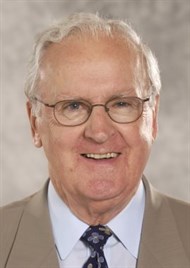 Murray Costello (CAN)
Murray Costello (CAN)
Born: South Porcupine, Ontario, Canada, 23 February 1934
A former NHLer during the glory days of the Original Six alongside his brother, Les, Murray Costello retired from hockey in 1960 and went on to a great career both nationally, in Canada, and internationally with the IIHF.
He earned a law degree at the University of Ottawa after leaving the game as a player and started his administrative career working in the Western Hockey League. Astute, respected, and dedicated, he worked his way up through the ranks, becoming president of the Canadian Amateur Hockey Association (CAHA) in 1979. For the next two decades Costello was at the helm of the world’s most influential hockey body, and he oversaw massive change in every aspect of its operations.
Costello united the CAHA with Hockey Canada to create a new Hockey Canada, which stands today as the organization that oversees every aspect of hockey in the country, from grassroots development, to establishing youth playing rules, to the highest level of international competition.
His first great change after the merger was to introduce the Program of Excellence to Hockey Canada, the result of which created a junior program second to none. While hockey fans around the world love the annual U20 championship at Christmas and New Year’s, its success in Canada started with that Program and Costello’s ability to convince the country’s three junior leagues (OHL, QMJHL, WHL) to give up their top players for U20 participation.
Additionally, Costello was a supporter of women’s hockey at a time when the game was just developing, and it was under his aegis that the IIHF instituted a Women’s World Championship starting in 1990.
As well as his work with Hockey Canada, Costello also served on the Hockey Hall of Fame Board of Directors starting in 1981. He later expanded his interests to include the IIHF and became a member of the IIHF Council for many years. Recently, he served on the Medical Committee and has contributed more specifically to the IIHF’s expanded network of research into concussions, head injuries, and player safety.
He was inducted into the Hockey Hall of Fame as a Builder in 2005 and retired from his formal IIHF duties in 2013.
Paul Loicq Award
(for outstanding contributions to international hockey)
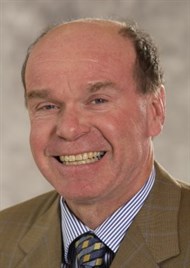 Dr Mark Aubry (CAN)
Dr Mark Aubry (CAN)
Born: Noranda, Quebec, Canada, 24 November 1954
For more than three decades Dr Mark Aubry has been involved in sports as a doctor both locally in the Ottawa, Canada area and internationally at all top levels of competition.
After starting as the team physician for the Ottawa Rough Riders of the Canadian Football League in 1983, Aubry entered the international hockey arena in 1992 when he was named the chief medical officer for the Canadian Olympic Team in Albertville. That first experience was highly successful and led him to pursue a career in sports medicine with the IIHF that flourishes to this day.
The co-director of the Ottawa Sport Medicine Centre, Aubry became the team physician for the Ottawa 67’s of the Ontario Hockey League in 1996, a position he held for a decade. He later became team physician for the Ottawa Senators of the NHL.
In 1998, he became the CMO for the IIHF and six years later added the same title for Hockey Canada to his expanding role in international hockey. He continues to maintain both roles into 2014 and beyond.
Aubry’s role has been one not only of treatment but of prevention. He helped organize the first three Symposia on Concussions in Sport, first in 2001 in Vienna, then 2004 in Prague, and again in 2008 in Zurich. These meetings helped doctors from around the world clarify and detail an agreement on how to identify, assess, and treat concussions, findings that have gone a long way to understanding head injuries.
In addition to his work on concussions, Dr Aubry has made impressive contributions to the research of spinal cord injuries in sport. He helped develop the Hockey Canada Safety Program and is a member of the Hockey Canada Safety Program Committee.
Additionally, he is a member of the International Olympic Committee’s medical commission, and in 2006 Dr Aubry received the Dr Tom Pashby Sports Safety Award, the most prestigious sports medicine honour in Canada.
Coaching Symposium
An IIHF International Coaching Symposium will be held 16-18 May during the 2014 IIHF Ice Hockey World Championship in Minsk.
The event will be organized by the International Ice Hockey Federation and the Organizing Committee of the 2014 IIHF Ice Hockey World Championship at Hotel Yubileiny with simultaneous English/Russian interpreters.
Program:
Friday, 16 May 2014
11.00 – 13.00: Registration / lunch
13.00 – 13.15: Introduction
13.15 – 14.15: Vladimir Yurzinov Sr, MHL Board Member: “Technical skills as a basis of modern hockey”
14.30 – 15.30: Jim Brithén, International Ice Hockey Coach
15.30 – 16.00: Coffee break
16.45: Game USA vs. Kazakhstan
20.45: Game Finland vs. Switzerland
Saturday, 17 May 2014
09.00 – 09.45: Yuri Nikonov, BIHA: “Physical skills of players in the long-term practice process”
10.00 – 10.45: Mika Saarinen
10.45 – 11.15: Coffee break
11.15 – 12.00: Torgny Bendelin - Taking over a Team in the middle of a Season
12.00 – 13.00: Lunch
13.00 – 14.00: Vasili Konovalov, Severstal Cherepovets: “Modern approaches to organizing complex control of players”
14.00 – 14.30: Coffee break
14.30 – 15.30: Dr Gennadi Gorbunov, St. Petersburg University of Physical Training: “Professional level of coaches in modern hockey”
16.45: Game Denmark vs. Czech Republic
20.45: Game Slovakia vs. Italy
Sunday, 18 May 2014
09.00 – 10.00: Bob Leslie - Applying the 10 Habits of High Performance Business Teams to the World of Hockey
10.00 – 11.00: Jeremy Weiss, International Ice Hockey Coach
11.00 – 11.30: Coffee break
11.30 – 12.30: Vladimir Bure, KHL President Advisor: “Functional skills on ice in the pre-season period”
12.30 – 13.30: Lunch
13.30 – 14.30: Nikolai Kuznetsov, KHL Corporate Expert: “Organization of practice processes during competitions”
14.30 – 15.00: Coffee break
15.00 – 15.30: Wrap-up
16.45: Game Canada vs. Sweden
The participation fee (€350 plus accommodation) includes:
- Full participation in all Symposium activities
- Presentation materials
- Symposium registration kit
- Lunches and coffee breaks for the duration of the Symposium
- 5 tickets to World Championship games and transportation to/from them
Availability of accommodation is guaranteed if you register as a symposium participant until 25th April 2014. Any cancellation 30 or fewer days before the expected arrival will be charged according to the cancellation policy of the hotel (100% of the value).
Accommodation costs:
Single room – €85 per day
Twin room – €55 per bed/day
Application form can be downloaded here. Please, send the filled-in application form to the following e-mail address: putilin@hockey.by
For all organizational questions, please contact Andrei Putilin at putilin@hockey.by or +375 29 166 20 14.
See you in Minsk!
Media Accreditation
Accreditation for the 2014 IIHF Ice Hockey World Championship in Minsk, Belarus, will be open until 31 January, 2014. Media members who are registered into the accreditation system will not be required to obtain a visa for entry into Belarus.
Click here to access the accreditation system.
Any issues with the system should be reported to media@iihf.com.
International radio and TV requests as well as websites with audio/video coverage should also send accreditation requests to media@iihf.com.
Hotel Belarus, located in the downtown area of Minsk, has been designed as a media hotel. The official travel partner of the 2014 World Championship in charge of booking hotels is CentrKurort.
Any media members with questions about accommodation during the World Championship should contact hockey@ck.by.
Note: Any media wishing to cover topics that are not related either to ice hockey or to the 2014 IIHF Ice Hockey World Championship must apply for an additional foreign journalist accreditation from the Belarusian Ministry of Foreign Affairs, as per Belarusian law. Application forms can be obtained in English by clicking the link below:
http://mfa.gov.by/en/press/accreditation/
Organizing Committee
The Organizing Committee for the 2014 IIHF Ice Hockey World Championship was established by the resolution of the Executive Committee of the Belarusian Ice Hockey Association on 25 November 2010.
The Organizing Committee acts on the basis of the legislation of the Republic of Belarus and the Charter, and its activity is aimed at organization and holding of 2014 IIHF Ice Hockey World Championship in Minsk.
The Organizing Committee closely cooperates with International Ice Hockey Federation (IIHF) and their commercial partner, the international sports marketing agency Infront Sports & Media.
Address: Pobeditelei Ave., 20/3, 220020 Minsk, Belarus
Phone: +375 17 254-54-82
Fax: +375 17 254 58 42
Staff of the Organizing Committee
Yevgeni Vorsin
Director
Tel. +375 17 254 54 82
E-mail: info@hockey.by
Alexander Shevel
Deputy Director
Tel. +375 17 331 77 94
E-mail: shevel@hockey.by
Galina Makovets
Chief Accountant
Tel. +375 17 396 12 21
E-mail: makovec2011@mail.ru
Piotr Rabukhin
Promotion Manager
Tel. +375 17 395 77 21
E-mail: pr47117@yandex.ru
Gennadi Ivanyuk
Manager responsible for reception, stay and transportation of official participants and guests of the WM
Tel. +375 17 395 77 25
E-mail: gai51@inbox.ru
Dmitri Melnik
Event Manager
Tel. +375 17 286 71 43
E-mail: zomelzon@mail.ru
Dmitri Trofimovich
Financial Manager
Tel. +375 17 396 12 00
E-mail: oleg40@tut.by
Ruslan Voronkov
Security Manager
Tel. +375 17 395 77 26
E-mail: vrm301@gmail.com
Tatyana Noskovich
Supplies Manager
Tel. +375 17 395 77 25
E-mail: noskovich2014@mail.ru
Andrei Putilin
Ceremonies and Protocol Manager
Tel. +375 17 286 71 43
E-mail: putilin@hockey.by
Maxim Koshkalda
Recruiting Manager
Tel. +375 29 149 46 91
E-mail: koshkalda@gmail.com
Olga Kolpinskaya
Translator
Tel. +375 17 284 36 72
E-mail: olgakolpinskaya@gmail.com
Ivan Semyakin
Transportation Manager
Tel. +375 17 331 70 66
E-mail: suda22@yandex.ru
Anton Kuzmich
Ticketing Manager
Tel. +375 17 331 70 66
E-mail: ant.kuzmich@gmail.com
Yulia Kasianova
Event Manager
Tel. +375 17 286-71-43
E-mail: kasianova@hockey.by
Contacts
International Ice Hockey Federation
Address Headquarters:
Brandschenkestrasse 50, Postfach, 8027 Zurich, Switzerland
Tel. +41 44 562 22 00
Fax +41 44 562 22 29
E-mail Office: office@iihf.com
E-mail Media Relations: media@iihf.com
E-mail Website: webmaster@iihf.com
E-mail Video Stream: support@2014iihfvideo.com
Photography: www.imagesonice.net
2014 IIHF Ice Hockey World Championship Organizing Committee
Address:
Pobeditelei Ave. 20/3, 220020 Minsk, Belarus
Tel. +375 17 254 58 19, 254 54 83, 254 73 13
Fax +375 17 254 58 42
E-mail: pr47117@yandex.ru



















































